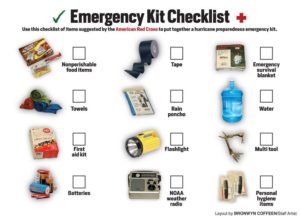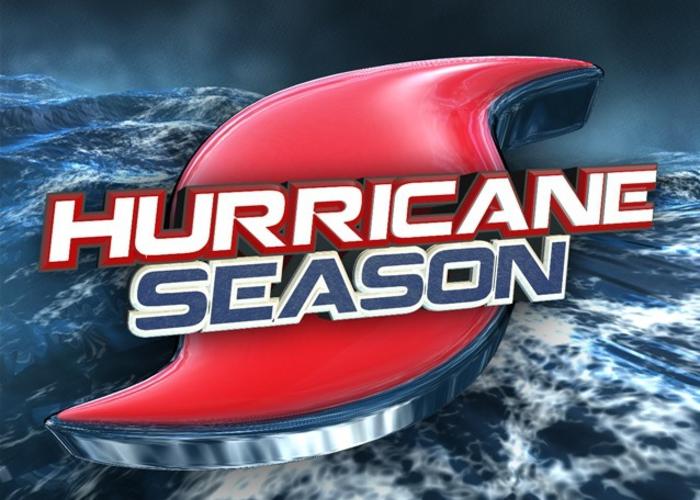With hurricane season in full swing in Florida and throughout the south, families caring for elders and loved ones with disabilities need to be prepared. There are three phases to hurricane readiness:
Before the Hurricane: 
- Have a plan for you, your family, and your pets. Communicate that plan with everyone in your family and the caregivers who assist your family.
- Know where your local special needs shelter is and what you or your loved one will need if he or she needs to evacuate to it.
- Make a survival kit, including a battery-powered radio, bottled water, and a 2-week supply of nonperishable foods (energy bars, granola bars, tuna fish, peanut butter, crackers, etc.). If you have to evacuate, make sure your emergency supplies are contained in a backpack.
- Fill your vehicle’s gas tank and check oil, water and tires. REMEMBER, gas pumps don’t work without electricity.
- Review your homeowner’s or renter’s insurance policies, and consider purchasing flood insurance if you reside in a flood-prone area.
- Identify a safe area in your home in which to stay in the event of high winds, tornado, or other bad weather – an interior room, closet, hallway, or bathroom on the lowest floor.
- Create a folder of your important documents, including durable powers of attorney, health care advance directives, trust documents, insurance documents (health, home and life), identification (Florida ID, military ID, Medicare card, insurance cards, Medicaid card), credit card, and list of current list of medications.
- Refill prescriptions and maintain a one-month supply during hurricane season to ensure that vital medicines are not missed.
- Cover all windows and doors, especially patio doors, with securely fastened, impact-resistant shutters or plywood. If your home has shutters, close them.
- Remove all “missiles” from around the home. These include anything in the yard not attached to the ground that could become wind-borne–barbecue grills, trashcans, flower pots, umbrellas, patio-furniture, toys, yard decorations, and flag posts. Disconnect any entryway chandeliers or tie to a concrete pole.
- Trim trees – trimming trees reduces the likelihood of a tree falling down or catching wind and causing more damage to homes or cars.
- If you have a generator, determine a location in advance and be careful! Do not place the generator in the garage, home, or carport to prevent carbon monoxide poisoning. Place generator away from your house and connect a chain to a nearby structure or tree for support and to prevent it from being stolen.
As the Hurricane approaches:
- Check to see if your elderly loved one or loved one with a disability is in an evacuation area. If so, notify local authorities that your loved one may need to be evacuated to a special needs shelter.
- Review your plan with your family and your caregivers.
- Locate your survival kit and your folder of important documents.
- Listen to weather updates on TV or radio. If power is lost, listen to updates on a battery operated radio.
- Turn off any utilities as instructed by authorities.
- Turn off electricity if flood waters threaten your property.
- Turn off major appliances, such as the air conditioner and water heater, if you lose power.
- If your utilities can remain on, turn the refrigerator thermostat to its coldest setting and keep its doors closed. This will help preserve food should there be a power failure.
- If you use propane for any purpose on your property, turn off propane tanks.
After the Hurricane:
- Check on all your family members and their caregivers.
- Assess and document any damage to your property and that of your loved ones. You can photograph damages with your cell phones or even make handwritten lists of damages.
- Monitor local radio and TV for recovery activities. If you are without electricity, monitor your battery operated radio.
- Be prepared to live without power, normal access to water, food, or any of the services you rely on regularly.
- Use a generator, if you have one for essential activities. Be sure to keep the generator outdoors or in a well-ventilated area. When running an electrical cord from the generator to your house, make sure it has a clean path, out of standing water and out of the rain.
- Avoid driving. Debris in roadways is a safety hazard.
- STAY AWAY FROM DOWNED UTILITY WIRES!
- Use grills outdoors only.
- Use your telephone only for emergencies so lines can remain open for emergency communications.
- If widespread flooding occurs, you may have to disinfect any tap water by boiling it first, or by adding chlorine bleach (8 drops per gallon), before consuming it.
- Report damage to your home or business to your local emergency management office.
- Make temporary repairs to your roof, walls or windows to make your home safe and minimize further damage. (BE AWARE THAT IN THE AFTERMATH OF A HURRICANE HOME REPAIR AND CLEAN UP SCAMS ARE RAMPANT SO PROTECT YOURSELF!) Hire a licensed contractor to do permanent repairs. Contact your insurance company.
If you must clean up on your own, follow these CLEAN-UP PRECAUTIONS:
- Call professionals to remove large, uprooted trees, etc.
- Always use proper safety equipment such as heavy gloves, safety goggles, heavy boots, light-colored long-sleeve shirts and long pants.
- Tie back long hair and wear a hat and sunscreen.
- Drink plenty of fluids, rest, and ask for help when you need it.
- Lift with your legs, not with your back.
- Don’t burn trash.
- If you can’t identify something, don’t touch it.
- Be especially wary of downed electrical wires.
- Be extremely careful with a chainsaw – don’t use it for the first time to clear your yard, and always heed safety warnings.
Hurricane season is difficult for everyone. However, there are added challenges for those who are caring for elders or people with disabilities. Preparation is the only way to meet these challenges. There are many resources available.
Federal Emergency Management Agency
Florida Division of Emergency Management
American Red Cross North Florida Chapter
American Red Cross Preparing for All Disasters
The Official 2016 Disaster Survival Guide for the Capital Area


